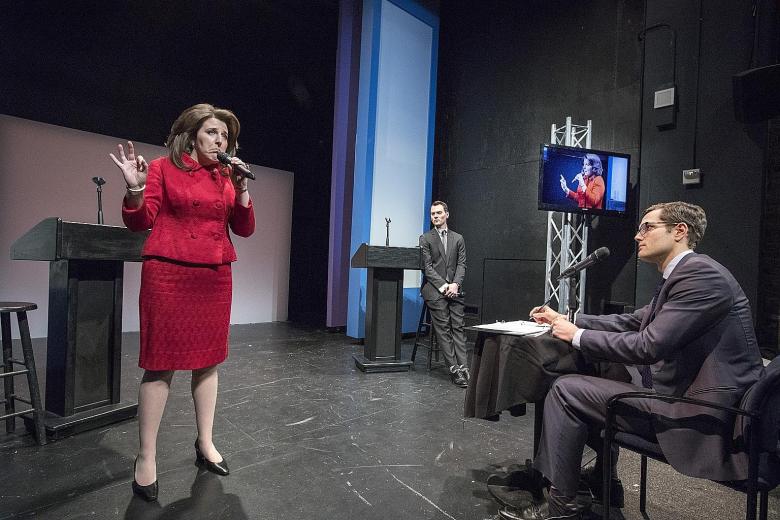NEW YORK • He smiled. She sniffed. He sat. She stalked. He called her a "puppet". She called him a "nasty man". These were the 2016 presidential debates as re- enacted in Greenwich Village over the weekend.
At the Provincetown Playhouse last Saturday, professors from New York University, the Rhode Island School of Design and the French business school Insead twice presented Her Opponent, a free 35-minute performance composed of excerpts from the three presidential debates with a significant twist in the casting: Mr Donald Trump was played by a woman, Rachel Tuggle Whorton, a PhD candidate and adjunct instructor at NYU.
Mrs Hillary Clinton was played by a man, Daryl Embry, another adjunct instructor.
To complete the gender inversion, the candidates were given new names, Brenda King in place of Mr Trump, Jonathan Gordon for Mrs Clinton.
Drawing on the techniques of documentary theatre, as practised by the likes of Anna Deavere Smith, these actors not only studied the words of the candidates, but also the gestures, posture, tempo and vocal intonation that each used.
As Andy Wagner, the actor playing the moderator, explained, the creators wanted to see if gender- inverted casting would "cause people to revisit their own personal biases and develop insights or a different perspective".
At the playhouse, the stage was sparsely decorated with two lecterns and two monitors. The atmosphere among the standing-room- only crowd, which appeared mostly drawn from academic circles, was convivial, but also a little anxious. Most of the people there had watched the debates assuming that Mrs Clinton could not lose. This time, they watched trying to figure out how Mr Trump could have won.
Interviews with cast members and comments from the post-show discussion suggested that they had found some answers.
Her smile (performed by him)
In the first debate, Embry, as Gordon, smiled. And smiled. And smiled some more. If you were sympathetic, it was a knowing smile, an inclusive smile, a "let's not stoop to that level, but can you believe this" smile. If you were less approving, the tightly controlled smile could be seen as supercilious.
"Is it patronising? Is it condescending?" wondered Embry, speaking before the performance. "You see her filtering what she wants to say, biting back a reaction and then going in a much more polished, dignified way."
A woman at the talk-back described that constant smile as "really punchable".
The Attacks
In the second debate, Whorton, as Brenda King, continually attacked. A question about taxes became a protest about why nothing had been done to close tax loopholes, then skittered into a condemnation of former US President Barack Obama's actions in the Middle East.
Embry, reciting Mrs Clinton's lines, also attacked, but not as viciously. He offered a rushed precis of a tax plan and detailed her accomplishments, responses that may not have stuck in the mind as fixedly as Mr Trump's barbs or his jokes, like a refusal to name Mrs Clinton's donors. "I won't mention their names, because they're rich, but they're not famous. So we won't make them famous."
"I was struck by the strength of the technique of the Brenda King character," said a man in the audience, speaking after the show. "Attack. Consistently attack."
A woman said: "When she was attacking, I had so much respect for her and her level of confidence."
Bad behaviour
Excerpts from the third debate skipped several of the flashpoints - the "bad hombres", Mr Trump's refusal to agree to honour the election results.
But as performed by the actors, that debate did include name-calling, in which Gordon referred to King as a likely puppet of Mr Vladimir Putin. "You're the puppet," she shot back, schoolyard-style.
The Gordon character did not interrupt nearly as frequently. King's discourteous behaviour ruffled the moderator. But it also helped her undermine Gordon's rhetoric.
A woman who had supported Mrs Clinton sounded pained at the talk-back as she described her reaction to the Gordon character.
"I felt that he was weak and that I didn't really like him," she said.
And Dr Joe Salvatore, an NYU professor and one of the project's creators, reflected on what he had learnt about Mr Trump. "At the time of the debates, I dismissed him as awkward, unskilled, untrained," he wrote in an e-mail message. "Now, I'm not so sure that I would do that."
NYTIMES

